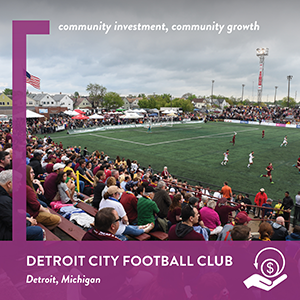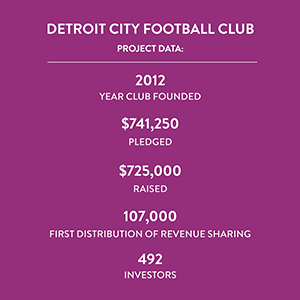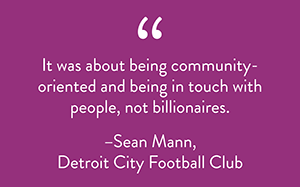 MAKING HISTORY BY SAVING HISTORY
MAKING HISTORY BY SAVING HISTORY
In 2016, history was made for the umpteenth time in Detroit.
Investors from all over the world pledged nearly $750,000 to rehabilitate the historic — but crumbling — Keyworth Stadium in Hamtramck, Michigan.
The goal? Give a boost to the future of the city, inspire the next generation of Michigan soccer enthusiasts and create a permanent home for the Detroit City Football Club.
The crowd went wild over the hat trick. The Detroit City FC community investment campaign was the first of its kind in U.S. sports history.
“We took a different approach to sports business,” said Sean Mann, one of five Detroit City FC owners and the team’s general manager. “Sports teams are traditionally loss leaders, but with our model they have mutual pressure to break even. Supporters were invited to make a financial investment and earn a financial return, rather than making a donation or pre-purchasing a product.”
 Steps to success
Steps to success
The campaign, which spanned 109 days, allowed supporters to directly loan money to Detroit City FC and earn interest on that loan to grow their club and community. Initially, the club aimed to raise between $400,000 and $750,000 to fund the improvements. Investment tiers ranged from $250 to $50,000 in community-sourced revenue-share loans, which are intended to be repaid, with interest, according to the revenues earned by the club.
“We worked really hard to create the narrative of ownership,” Mann said. “Detroit City FC is a for-profit business, and we didn’t want to be seen as a charity. We were paying people back, asking our supporters to make a true investment.”
Final community investments totaled $725,000, which meant the club was able to distribute $107,000 in revenue-sharing checks to the 492 investors who participated in the grassroots campaign in just a few short months.
“Our revenues were up by more than 17% from what was projected for the first six months of the year, meaning investors were paid more than the estimated 10.4% internal rate of return for the first payback period,” said Mann. “Right now, it looks like we are going to pay everyone back in less than five years.”
The lessons
Mann has some pretty solid advice for businesses considering investment-based crowdfunding: You have got to be sure you have buy-in from your community, and you have got to be ready for some incredibly labor-intensive work.
“It’s a debt,” he said. “You better have a plan to pay it back, because the last thing you want to do is let your supporters down.”
Club founders treated the investment campaign like a political campaign. They identified hundreds of targets and dedicated hours upon hours of phone time.
“The hardest part was sucking it up and being willing to beg for money, but you have to have your hat out asking for support.”
The impact
Today, Detroit City FC has established itself as one of the most talked-about soccer teams in North America.
“It was about being community-oriented and being in touch with people, not billionaires,” Mann said.
